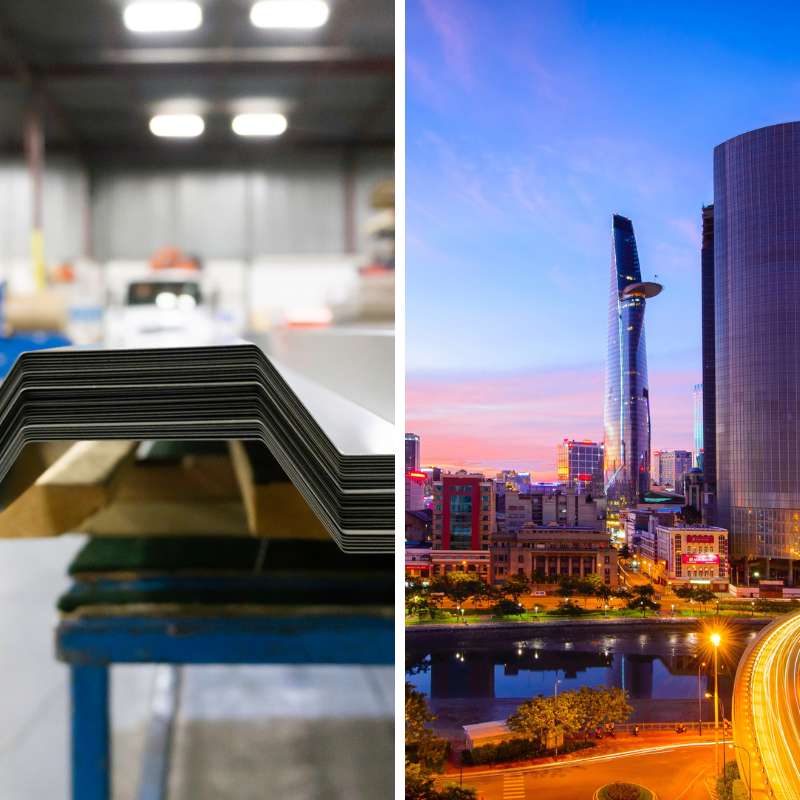Vietnam’s Metal Sheet Manufacturing Sector: An Overview
Vietnam’s metal sheet manufacturing sector is a rapidly growing industry that plays a significant role in the country’s industrialization and modernization process. This growth can be attributed to increasing domestic demand, strategic geographic location, favorable government policies, and abundant cheap labour.
The Rise of Vietnam as a Key Metal Sheet Producer in Southeast Asia
As of 2023, Vietnam is one of Southeast Asia’s leading metal producers. The country has witnessed an influx of foreign direct investments (FDIs) in the metal sheet manufacturing sector in the past few years, mainly from Japan, South Korea, and China. Foreign companies are primarily attracted by Vietnam’s strategic location near key shipping routes, offering low-cost transportation for export-oriented companies.
South Korea and Japan have a long history of investing in Vietnam, but China is a relatively new player.
One of the main reasons for Chinese investments is the rapidly growing labour cost in China and additional customs duties imposed for Chinese products entering the US market.
Role of Government Policies in Boosting the Metal Sheet Manufacturing Sector
The Vietnamese government has proactively boosted the metal sheet manufacturing sector by providing a conducive business environment. They have made significant strides in policy reform and incentives to attract domestic and foreign investments.
This has been done through tax incentives, simplifying licensing processes, and improving infrastructure. The government is also enhancing the country’s technological capabilities to move up the value chain in metal sheet production.
Growing Domestic Demand: A Key Driver for the Industry
Domestic demand for metal sheet products in Vietnam has seen an uptick due to the rapid growth in the construction, automotive, and electronic industries. The rising middle class, urbanization, and industrial development have led to increased consumption of automobiles and electronic goods, directly fueling the demand for metal sheets. Also, the government’s investment in infrastructure projects has spiked the need for metal sheets in construction.
Addressing the Challenges: Lack of Advanced Technology and Skilled Labour
While Vietnam’s metal sheet manufacturing sector has seen impressive growth, some challenges still need to be addressed. One of the primary challenges is the lack of advanced technology and skilled labour. Although the government is striving to upgrade the technological capabilities of the sector, most local manufacturers still rely on traditional methods, which reduces operational efficiency and product quality.
Environmental Challenges and Regulations in the Manufacturing Sector
The sector also faces environmental challenges, as the production of metal sheets involves processes that can cause pollution. The Vietnamese government has been tightening environmental regulations, which is a positive step towards sustainable development, but it also adds to the operational costs for the manufacturers.
Despite these challenges, the outlook for Vietnam’s metal sheet manufacturing sector remains positive. In the era of Industry 4.0, the Vietnamese government is working on strategies to promote digital transformation in the industry. Adopting advanced technologies such as AI, IoT, and automation can significantly enhance metal sheet manufacturers’ operational efficiency and productivity.
How Free Trade Agreements Benefit Vietnam’s Metal Sheet Manufacturing Sector
Vietnam’s participation in several free trade agreements (FTAs), like the Comprehensive and Progressive Agreement for Trans-Pacific Partnership (CPTPP) and the EU-Vietnam Free Trade Agreement (EVFTA), also provides significant advantages.
These agreements lower trade barriers, reduce tariff rates, and open access to numerous international markets, making it lucrative for businesses to outsource their metal sheet manufacturing to Vietnam.
Moreover, the country’s strategic geographical location and excellent connectivity to major global markets make it a logistical hotspot.
Vietnam has access to significant international seaports, enabling efficient and cost-effective transportation, thus adding to the convenience of outsourcing.
Cost Competitiveness: An Attractive Factor for Outsourcing
Cost competitiveness is another vital factor that makes Vietnam an attractive outsourcing destination. The labour cost in Vietnam is considerably lower than in other countries, significantly reducing production costs. Moreover, the country has a young, dynamic, and rapidly growing workforce, ensuring the availability of labour for manufacturing operations.
The Role of Vietnam’s Industrial Zones in Attracting Foreign Companies
The industrial zones in Vietnam are another vital factor that provides numerous advantages to foreign companies looking to outsource.
These zones are well-equipped with the necessary infrastructure, such as electricity, water supply, and logistics facilities, required for smooth manufacturing operations. They also offer ready-built factories and warehouses, reducing companies’ setup time and costs.
Understanding the Challenges of Outsourcing to Vietnam
While the opportunities are substantial, it is crucial to recognize the challenges in outsourcing metal sheet manufacturing to Vietnam. These include language barriers, cultural differences, and regulatory complexities that foreign companies face.
However, many of these challenges can be mitigated with careful planning and by partnering with local consultants with an in-depth understanding of the Vietnamese metal manufacturing landscape.
Furthermore, while the cost of labour is low in Vietnam, there is a relative shortage of skilled labour.
The Vietnamese government is addressing this issue through various vocational training programs. Still, companies may initially need to invest in training and development to ensure their workforce has the necessary skills.
In summary, Vietnam offers many opportunities for outsourcing in the metal sheet manufacturing sector.
The combination of favourable government policies, cost-effectiveness, strategic location, and technological advancements makes the country an attractive outsourcing destination.
Although there are challenges, careful planning and effective collaboration with local partners can help foreign companies successfully navigate the Vietnamese market and reap the benefits of outsourcing your metal production to Vietnam.
If you want to discuss more about your opportunity in Vietnam, contact our team of specialists.
We have successfully helped several companies set up their supply chains in Vietnam with a fast and cost-effective supplier search process, saving money compared to the trial-and-error method used by companies looking for a shortcut. As always, good preparatory work and a solid local partner, in the end, pays off.

